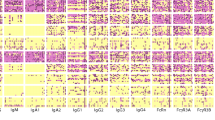Abstract
Background
Infliximab (IFX) and adalimumab (ADA) cross the placenta in the third trimester and can be detectable in infants for up to 12 months.
Aim
The aim of this study was to determine whether in utero IFX or ADA exposure results in an impaired immune response in infants, as measured by immunoglobulin levels and antibody responses to routine primary immunizations.
Methods
Infants who were exposed to in utero anti-TNFα agents were prospectively evaluated. Immunoglobulin levels (IgG, IgM, IgA) and antibodies to standard vaccinations, including tetanus toxoid (tetanus) and Haemophilus influenza type b (Hib), were measured in infants of at least 6 months of age.
Results
Twelve infants were prospectively studied: 10 exposed to in utero IFX and 2 exposed to ADA with at least one dose administered in the third trimester. Immunoglobulin levels were available on 10/12 patients, with all showing adequate immunoglobulin levels, except for low IgM levels in 5 (50 %) infants. Adequate responses to both the tetanus and Hib vaccines were seen in 11 of 12 (92 %) infants.
Conclusions
Infants exposed to anti-TNFα agents in utero demonstrate appropriate response to two commonly administered neonatal vaccines and show adequate immunoglobulin levels, except for IgM. Newborns with a history of exposure to anti-TNFα agents should follow a standard vaccination schedule for inactive vaccines.
Similar content being viewed by others
References
Loftus E, Sandborn W. Epidemiology of inflammatory bowel disease. Gastroenterol Clin N Am. 2002;31:1–20.
Bush MC, Patel S, Lapinksi RH, et al. Perinatal outcomes in inflammatory bowel disease. J Matern Fetal Neonatal Med. 2004;15:237–241.
Norgard B, Hundborg HH, Jacobsen BA, et al. Disease activity in pregnant women with Crohn’s disease and birth outcomes: a regional Danish Cohort study. Am J Gastroenterol. 2007;102:1947–1954.
Reddy D, Murphy S, Kane S, et al. Relapse of inflammatory bowel disease during pregnancy: in-hospital management and birth outcomes. Am J Gastroenterol. 2008;103:1203–1209.
Katz JA, Antoni C, Keenan GF, et al. Outcomes of pregnancy in women receiving infliximab for the treatment of Crohn’s disease and rheumatoid arthritis. Am J Gastroenterol. 2004;99:2385–2392.
Mahadevan U, Cucchiara S, Hyams J, et al. The London position statement of the World Congress of Gastroenterology on Biological Therapy for IBD with the European Crohn’s and Colitis Organization: pregnancy and pediatrics. Am J Gastroenterol. 2011;105:214–223.
Casanova MJ, Chaparro M, Domenech E, et al. Safety of thiopurines and anti-TNF drugs during pregnancy in patients with inflammatory bowel disease. Am J Gastroenterol. 2013;108:433–440.
Mahadevan U, Martin C, Sandler RS, et al. PIANO: a 1000 patient prospective registry of pregnancy of pregnancy outcomes in women with IBD exposed to immunomodulators and biologic therapy. Gastroenterol. 2012;142:S-149. (abstract).
Mahadevan U, Wolf D, Dubinsky M, et al. Placental transfer of anti-tumor necrosis factor agents in pregnant patients with inflammatory bowel disease. Clin Gastro Hepatol. 2013;11:286–292.
Julsgaard M, Christensen L, Gibson P. Adalimumab and infliximab level in neonates. Gastroenterology. 2015;148:S-108. (abstract).
Pasparakis M, Alexopoulou L, Episkopou V. Immune and inflammatory responses in TNFα-deficient mice: a critical requirement for TNFoL in the formation of primary B cell follicles follicular dendritic cell networks and germinal centers, and in the maturation of the humoral immune response. J Exp Med. 1996;184:1397–1411.
Wen L, Shinton SA, Hardy RR, et al. Association of B-1 B cells with follicular dendritic cells in spleen. J Immunol. 2005;174:6918–6926.
Mamula P, Markowitz J, Piccoli D. Immune response to influenza vaccine in pediatric patients with inflammatory bowel disease. Clin Gastro Hepatol. 2007;5:851–856.
Fiorino G, Peyrin-Biroulet L, Naccarato P, et al. Effects of immunosuppression on immune response to pneumococcal vaccine in inflammatory bowel disease: a prospective study. Inflamm Bowel Dis. 2012;18:1042–1047.
Yeh S, Ward J, Partridge S. Safety and Immunogenicity of a pentavalent diphtheria, tetanus, pertussis, hepatitis B and polio combination vaccine in infants. Pediatr Infect Dis J. 2001;20:973–980.
Kane S, Acquah L. Placental transport of immunoglobulins: a clinical review for gastroenterologist who prescribe therapeutic monoclonal antibodies to women during conception and pregnancy. Am J Gastroenterol. 2009;104:228–233.
Vasiliauskas EA, Church JA, Silverman N, et al. Case report: evidence for transplacental transfer of maternally administered infliximab to the newborn. Clin Gastroenterol Hepatol. 2006;4:1255–1258.
Zelinkova Z, de Haar C, de Ridder L, et al. High intra-uterine exposure to infliximab following maternal anti-TNF treatments during pregnancy. Aliment Pharmacol Ther. 2011;33:1053–1058.
Nesbitt A, Brown D, Stephens S. Placental transfer and accumulation in milk of the anti-TNF antibody TN3 in rats: immunoglobulin G1 verus PEGylated Fab. Am J Gastroenterol. 2006;101:S420–S470. (abstract).
Martin PL, Oneda S, Treacy G. Effects of an anti-TNF-alpha monoclonal antibody, administered throughout pregnancy and lactation, on the development of the macaque immune system. Am J Reprod Immunol. 2007;58:138–149.
Bortlik M, Duricova D, Machikova N, et al. Impact of anti-tumor necrosis factor alpha antibodies administered to pregnant women with inflammatory bowel disease on long-term outcome of exposed children. Inflamm Bowel Dis. 2014;20:495–501.
Cheent K, Nolan J, Shariq S, et al. Case report: fatal case of disseminated BCG infection in an infant born to a mother taking infliximab for Crohn’s disease. J Crohns Colitis. 2010;4:603–605.
Author information
Authors and Affiliations
Corresponding author
Ethics declarations
Conflict of interest
Sarah Sheibani and Joseph Church have no conflicts of interest. Russell Cohen: Speaker’s Bureau, AbbVie, Entera Health, Takeda. Consultant, AbbVie, Celgene, Entera Health, Hospira, Janssen, Sandoz Biopharmaceuticals, Takeda, UCB. Clinical Trials (Principal Investigator), Astra-Zeneca, Celgene, Gilead, Mesoblast Ltd., Osiris. Therapeutics, Pfizer, Receptos, RedHill Biopharma, Sanofi-Aventis, UCB. Sundanda Kane: Research Support, UCB. Consultant, AbbVie. Marla Dubinksy: Consultant, Janssen, AbbVie, Takeda, Genentech, Boehringer Ingelheim, Celgene. Uma Mahadevan: Consultant, Janssen, AbbVie, UCB.
Rights and permissions
About this article
Cite this article
Sheibani, S., Cohen, R., Kane, S. et al. The Effect of Maternal Peripartum Anti-TNFα Use on Infant Immune Response. Dig Dis Sci 61, 1622–1627 (2016). https://doi.org/10.1007/s10620-015-3992-2
Received:
Accepted:
Published:
Issue Date:
DOI: https://doi.org/10.1007/s10620-015-3992-2




